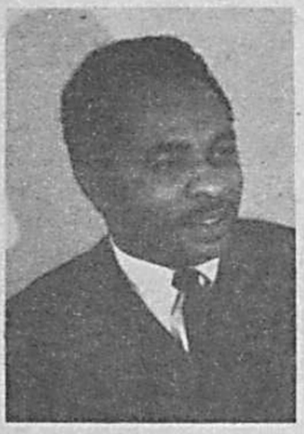Davy Jones comments: “Very well known is the story of Dr. Doris Wilkinson, the first UK female Black faculty member, hired in 1967, and to whom UK recently bestowed an Honorary Doctorate.
“However, apparently less well known and less expressly documented in our archives is the story of Dr. Joseph W. Scott, the first Black UK faculty member, hired in 1965. For a presentation, I was looking for a picture of Dr. Scott contemporary to the time, which turned out there are few. I did finally fine these two, and en route learned a number of aspects of Dr. Scott’s story.


Left photo credit: “Scott, Joseph W., Assistant Professor of Sociology, undated.” University of Kentucky Portrait Print collection (accession 2001UA028)
Right photo credit: Undated image from folder “Scott, Joseph, 2001-2002.” University of Kentucky. Department of Public Relations biographical files (accession 2010ua009)
“Dr. Scott (Bachelor’s Central Michigan University; Master’s, Doctorate, Indiana University) was hired by UK President John Oswald, with final Board action 03/19/1965, as an Assistant Professor in Sociology. Upon his arrival, Dr. Scott encountered ... as a middle-class professional ... that there were no integrated middle-class neighborhoods in Lexington at the time. He was the first Black resident in the previously all white neighborhood, about which he commented to the Louisville Courier-Journal newspaper on June 22, 1965: “It was quite a natural move for me, although it may have seemed unnatural to some people of Lexington,” Scott said. “Even when growing up in Detroit, I never lived in a segregated neighborhood. To segregate myself would be the change, not integration.”
“While at the University of Kentucky, Dr. Scott secured as PI (principal investigator) a federal Health, Education, and Welfare (HEW) Training Project grant. He was reappointed on 07/01/1966, but after this second year left UK in 1967. Upon arriving at Notre Dame in 1970, he established and was first Director of an attention-attracting Black Studies program. He eventually arrived at the University of Washington, where he retired into his current Professor Emeritus status. He continued to be active, both publishing and in advocacy activities, especially with the Ethiopian American community (from which roots his ancestry)."
“The only file in the UK Archives on him contains two documents. One is his CV, as updated May 2001. The other is a small testimonial he sent to UK Public Relations in 2002, on his time here during the mid 1960s (attached here). While it was relieving to read that he enjoyed his Dept. of Sociology faculty colleges, it was distressing to read his description of what he and his family went through in their home residential area."

Photo credit: Email from folder "Scott, Joseph, 2001-2002." University of Kentucky. Department of Public Relations biographical files (accession 2010ua009).
"He described living in an area with a name something like “Belmont.” So, I retrieved the fall 1965, 1966 and 1967 Lexington telephone books. For fall of 1965 and 1966, a “Joseph Scott” lived at 136 Delmont Drive. I looked that up on a Lexington map, and it is in the Cardinal Valley area of Lexington. I then checked a bit the history on that Delmont Drive area. One segment of that street was built mostly during the 1930s-1940s. The section of Delmont Drive containing his address was apparently new housing built in 1961."


This is the second post in an occasional series, “Davy Jones’ Locker.” Follow along with Davy Jones, Professor Emeritus in the Department of Toxicology and Cancer Biology in the University of Kentucky College of Medicine, as he explores various aspects of University of Kentucky history through the University Archives and online at ExploreUK.uky.edu. The “locker” in the accompanying photograph is one of the cubicles in the Special Collections Research Center’s Breckinridge Research Room where researchers can put their personal items.






